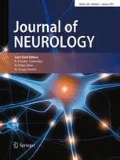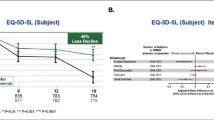Abstract
Background
Little is known about quality of life (QOL) at the time of multiple sclerosis (MS) or clinically isolated syndrome (CIS) diagnosis and how it evolves in the critical adjustment period immediately following a new diagnosis.
Objectives
To (1) describe QOL trajectory in the first year post-MS/CIS diagnosis and (2) examine associations of demographic and biopsychosocial factors with QOL at baseline and as it evolves over the first year post-MS/CIS diagnosis.
Methods
Participants were N = 250 individuals newly diagnosed with MS or CIS. Participants completed self-report assessments of QOL, demographics, and biopsychosocial factors at 1, 2, 3, 6, 9, and 12 months post-diagnosis using validated measures.
Results
At 1-month post-diagnosis, QOL M = 75.2/100 with subsequent assessments revealing consistent ratings on average. Modelling revealed a small number of variables that were predictive of QOL at baseline and/or change in QOL over time.
Conclusion
QOL in the first year post-MS/CIS diagnosis was, on average, high and stable. A subset of modifiable factors across the biopsychosocial spectrum was associated with baseline level of QOL and change in QOL over time. The stability in QOL suggests that patients can be assessed early after diagnosis for key variables that are predictive of both current and future QOL.



Similar content being viewed by others
Availability of data and materials
Study data can be requested via the corresponding author.
Code availability
Study analytic code can be requested via the corresponding author.
References
Amtmann D, Bamer AM, Cook KF, Askew RL, Noonan VK, Brockway JA (2012) University of Washington self-efficacy scale: a new self-efficacy scale for people with disabilities. Arch Phys Med Rehabil 93:1757–1765
Bamer A, Cetin K, Amtmann D, Bowen J, Johnson K (2007) Comparing a self report questionnaire with physician assessment for determining multiple sclerosis clinical disease course: a validation study. Mult Scler J 13:1033–1037
Benedict RH, Munschauer F, Linn R, Miller C, Murphy E, Foley F, Jacobs L (2003) Screening for multiple sclerosis cognitive impairment using a self-administered 15-item questionnaire. Mult Scler J 9:95–101
Bowen J, Gibbons L, Gianas A, Kraft GH (2001) Self-administered expanded disability status scale with functional system scores correlates well with a physician-administered test. Mult Scler 7:201–206
Buhr K, Dugas MJ (2002) The intolerance of uncertainty scale: psychometric properties of the English version. Behav Res Ther 40:931–945
Campbell J, Rashid W, Cercignani M, Langdon D (2017) Cognitive impairment among patients with multiple sclerosis: associations with employment and quality of life. Postgrad Med J 93:143–147
Cella D, Nowinski C, Peterman A, Victorson D, Miller D, Lai JS, Moy C (2011) The neurology quality-of-life measurement initiative. Arch Phys Med Rehabil 92:S28–S36
Connor KM, Davidson JR (2003) Development of a new resilience scale: the Connor-Davidson Resilience Scale (CD-RISC). Depress Anxiety 18:76–82
de Groot V, Beckerman H, Lankhorst GJ, Polman CH, Bouter LM (2005) The initial course of daily functioning in multiple sclerosis: a three-year follow-up study. Mult Scler 11:713–718
Godin G, Shephard RJ (1985) A simple method to assess exercise behavior in the community. Can J Appl Sport Sci 10:141–146
Hart S, Fonareva I, Merluzzi N, Mohr DC (2005) Treatment for depression and its relationship to improvement in quality of life. Qual Life Res 14:695–703
Horton M, Rudick RA, Hara-Cleaver C, Marrie RA (2010) Validation of a self-report comorbidity questionnaire for multiple sclerosis. Neuroepidemiology 35:83–90
Janssens AC, van Doorn PA, de Boer JB, van der Meche FG, Passchier J, Hintzen RQ (2003) Impact of recently diagnosed multiple sclerosis on quality of life, anxiety, depression, and distress of patients and partners. Acta Neurol Scand 108:389–395
Jaracz K, Pawlak M, Górna K, Kołcz B, Wołoszyn D, Kozubski W (2010) Quality of life and social support in patients with multiple sclerosis. Neurol Neurochir Pol 44:358–365
Jensen MP, Turner JA, Romano JM, Fisher LD (1999) Comparative reliability and validity of chronic pain intensity measures. Pain 83:157–162
Kern S, Schrempf W, Schneider H, Schultheiss T, Reichmann H, Ziemssen T (2009) Neurological disability, psychological distress, and health-related quality of life in MS patients within the first three years after diagnosis. Mult Scler 15:752–758
Kobelt G, Berg J, Atherly D, Hadjimichael O (2006) Costs and quality of life in multiple sclerosis: a cross-sectional study in the United States. Neurology 66:1696–1702
Kroenke K, Spitzer RL, Williams JB (2001) The PHQ-9: validity of a brief depression severity measure. J Gen Intern Med 16:606–613
Krupp LB, LaRocca NG, Muir-Nash J, Steinberg AD (1989) The fatigue severity scale. Application to patients with multiple sclerosis and systemic lupus erythematosus. Arch Neurol 46:1121–1123
Nowinski JK, LoPiccolo J (1979) Assessing sexual behavior in couples. J Sex Marital Ther 5:225–243
Polman CH, Reingold SC, Banwell B, Clanet M, Cohen JA, Filippi M, Fujihara K, Havrdova E, Hutchinson M, Kappos L, Lublin FD, Montalban X, O’Connor P, Sandberg-Wollheim M, Thompson AJ, Waubant E, Weinshenker B, Wolinsky JS (2011) Diagnostic criteria for multiple sclerosis: 2010 revisions to the McDonald criteria. Ann Neurol 69:292–302
Putzki N, Fischer J, Gottwald K, Reifschneider G, Ries S, Siever A, Hoffmann F, Kafferlein W, Kausch U, Liedtke M, Kirchmeier J, Gmund S, Richter A, Schicklmaier P, Niemczyk G, Wernsdorfer C, Hartung HP (2009) Quality of life in 1000 patients with early relapsing-remitting multiple sclerosis. Eur J Neurol 16:713–720
Rintala A, Häkkinen A, Paltamaa J (2016) Ten-year follow-up of health-related quality of life among ambulatory persons with multiple sclerosis at baseline. Qual Life Res 25:3119–3127
Rintell DJ, Frankel D, Minden SL, Glanz BI (2012) Patients’ perspectives on quality of mental health care for people with MS. Gen Hosp Psychiatry 34:604–610
Ruet A, Deloire M, Hamel D, Ouallet JC, Petry K, Brochet B (2012) Cognitive impairment, health-related quality of life and vocational status at early stages of multiple sclerosis: a 7-year longitudinal study. J Neurol 260:776–784
Schmidt S, Jöstingmeyer P (2019) Depression, fatigue and disability are independently associated with quality of life in patients with multiple sclerosis: results of a cross-sectional study. Mult Scler Relat Disord 35:262–269
Spitzer RL, Kroenke K, Williams JB, Löwe B (2006) A brief measure for assessing generalized anxiety disorder: the GAD-7. Arch Intern Med 166:1092–1097
Spritzer KL, Hays R (2003) MOS sleep scale: a manual for use and scoring. RAND, Los Angeles, CA
Tepavcevic DK, Kostic J, Basuroski ID, Stojsavljevic N, Pekmezovic T, Drulovic J (2008) The impact of sexual dysfunction on the quality of life measured by MSQoL-54 in patients with multiple sclerosis. Mult Scler 14:1131–1136
Terrill AL, Hartoonian N, Beier M, Salem R, Alschuler K (2015) The 7-item generalized anxiety disorder scale as a tool for measuring generalized anxiety in multiple sclerosis. Int J MS Care 17:49–56
Topcu G, Griffiths H, Bale C, Trigg E, Clarke S, Potter K-J, Mhizha-Murira JR, Drummond A, Evangelou N, Fitzsimmons D (2020) Psychosocial adjustment to multiple sclerosis diagnosis: a meta-review of systematic reviews. Clin Psychol Rev 82:101923
Valentine TR, Alschuler KN, Ehde DM, Kratz AL (2021) Prevalence, co-occurrence, and trajectories of pain, fatigue, depression, and anxiety in the year following multiple sclerosis diagnosis. Mult Scler 13524585211023352
Vickrey BG, Hays RD, Harooni R, Myers LW, Ellison GW (1995) A health-related quality of life measure for multiple sclerosis. Qual Life Res 4:187–206
Watson D, Clark LA, Tellegen A (1988) Development and validation of brief measures of positive and negative affect: the PANAS scales. J Pers Soc Psychol 54:1063–1070
Wu N, Minden SL, Hoaglin DC, Hadden L, Frankel D (2007) Quality of life in people with multiple sclerosis: data from the Sonya Slifka Longitudinal Multiple Sclerosis Study. J Health Hum Serv Adm 30:233–267
Yalachkov Y, Soydaş D, Bergmann J, Frisch S, Behrens M, Foerch C, Gehrig J (2019) Determinants of quality of life in relapsing-remitting and progressive multiple sclerosis. Mult Scler Relat Disord 30:33–37
Zimet GD, Powell SS, Farley GK, Werkman S, Berkoff KA (1990) Psychometric characteristics of the multidimensional scale of perceived social support. J Pers Assess 55:610–617
Funding
Funding for this study was provided by the National Multiple Sclerosis Society (RG 4986A1/1).
Author information
Authors and Affiliations
Contributions
All authors meet the criteria for authorship defined by ICMJE.
Corresponding author
Ethics declarations
Conflicts of interest
Dr. Wundes discloses relationships with Biogen, Alkermes, and AbbVie for research funding, and AbbVie and Biogen for advisory boards. The other authors have no disclosures.
Ethics approval
This study was approved by the University of Washington Human Subjects Division.
Consent to participate
Informed consent was obtained from all individual participants included in the study.
Consent for publication
Informed consent included agreement to the publication of study findings.
Supplementary Information
Below is the link to the electronic supplementary material.
Rights and permissions
About this article
Cite this article
Alschuler, K.N., Whibley, D., Kratz, A.L. et al. Quality of life in individuals newly diagnosed with multiple sclerosis or clinically isolated syndrome. J Neurol 269, 2560–2572 (2022). https://doi.org/10.1007/s00415-021-10842-w
Received:
Revised:
Accepted:
Published:
Issue Date:
DOI: https://doi.org/10.1007/s00415-021-10842-w




